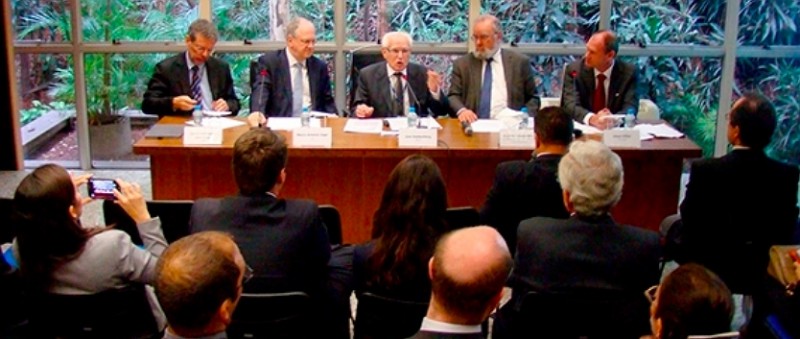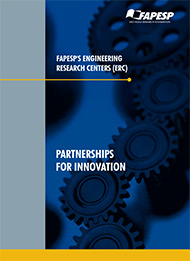New research center aims to increase share of natural gas in energy mix

16 de dezembro de 2015
By Diego Freire | Agência FAPESP – To help increase the share of natural gas in Brazil’s energy mix and mitigate greenhouse gas emissions in the coming decades, among other goals, FAPESP and BG Brasil, a BG Group company, have set up the Gas Innovation Research Center at the University of São Paulo (USP).
FAPESP will invest R$27 million and BG Brasil R$30 million. USP will contribute in the form of institutional and administrative support for the researchers involved.
The initiative was presented at a ceremony held on December 1 at FAPESP in São Paulo and attended by representatives of government, industry and the scientific community.
The Gas Innovation Research Center will be hosted by the University of São Paulo’s Engineering School (POLI-USP) and will be coordinated by Julio Meneghini, a member of the school’s faculty, and Alexandre Breda, BG Group’s Environmental Project Manager. It was one of several projects submitted in response to a joint call for proposals by FAPESP and BG Brasil. Its work will be carried out collaboratively by researchers at the University of São Paulo’s Energy & Environment Institute (IEE-USP), the Energy & Nuclear Research Institute (IPEN), the São Carlos Chemistry Institute (IQSC-USP), and the São Francisco Law School (FDSF-USP) in addition to POLI-USP, working with engineers from BG Brasil.
The following institutions are also associated with the initiative: the Sustainable Gas Institute at Imperial College London, University College London, Cambridge University and Leeds University in the UK; the University of Illinois at Urbana-Champaign and Texas A&M University in the US; Darmstadt Technical University in Germany; and Lyon University in France.
FAPESP’s President José Goldemberg said that the initiative is a milestone for Brazil’s participation in what he called “the global energy revolution”.
“The world is experiencing a revolution that will eventually lead to the development of an abundance of renewable energy sources, but we haven’t gotten there yet,” he argued. “Natural gas is a transitional fuel in this scenario because it’s the cleanest fossil fuel. FAPESP and BG Brasil are funding a venture with dimensions compatible with the challenges we face and São Paulo’s potential to generate clean energy. FAPESP believes in the role played by scientific knowledge in this revolution.”
For Adam Hillier, BG Group’s Chief Technology Officer, the Gas Innovation Research Center will develop important solutions to all partners involved.
“The Center will bring together BG Group’s expertise in natural gas and an array of scientific research fields in which São Paulo is a global leader,” he said. “Our partnership has the potential to develop world-class Brazilian research, supplying inputs for effective industrial applications in areas such as pre-salt oil production or the development and optimization of natural gas and hybrid powertrains for marine transportation systems, among others.”
Ricardo Toledo Silva, São Paulo State’s Undersecretary for Energy & Mining, highlighted the importance of natural gas as a solution to the challenges still faced in the area of renewable energy.
“We urgently need to increase the share of renewables in our energy mix, but they still face a major problem in terms of supply continuity,” he said. “The availability of biomass, for example, is seasonal, while solar and wind power are unstable and subject to a daily cycle. Researchers in several areas are interested in solving this and other problems. Storage of energy from renewable sources is an important solution of this kind. Until we get there, investment in the expansion of natural gas as a transition fuel to ensure a sufficient supply is extremely important.”
Cooperation
According to Carlos Henrique de Brito Cruz, FAPESP’s Scientific Director, the partnership between FAPESP and BG Brasil will enhance São Paulo State’s competitiveness in the field via cooperation among different areas.
“It will strengthen the alignment between the energy mix, especially in São Paulo, and policies that lead to a substantial reduction in greenhouse gas emissions,” he said. “The joint efforts that have enabled us to set up this Gas Innovation Research Center involve researchers from academia and business as well as a pool of students, in an international network of paramount importance to the development of scientific knowledge. Already there’s a key innovation here – it’s not a matter of a company using researchers in universities. What we have here are scientists working together.”
The academia-business cooperation aspect was also celebrated by Marco Antonio Zago, Rector of USP, who highlighted the participation of researchers at his university in the Center’s development.
“This initiative in an area that’s strategic not just for São Paulo but for the world shows the importance of the university’s role in basic research,” he said. “It also represents a major opportunity for cooperation between scientific researchers and industry. Three years of hard work by researchers at USP and by BG Brasil have resulted in a partnership capable of offering complete solutions to the challenges faced by Brazil and the world in the energy field.”
Challenges
The aims of the Gas Innovation Research Center are to increase the share of natural gas in the energy balance of São Paulo State and of Brazil as a whole; address the challenges of separating and transporting natural gas from the Santos offshore pre-salt basin to the coast; mitigate emissions of CO2, CH4 and other greenhouse gases; enhance the efficiency of combustion processes; foster biogas production and integrate it with the natural gas network in São Paulo; and develop innovative lightweight storage systems.
According to Meneghini, the Center will conduct complementary research programs in engineering, physical chemistry, and energy policy and economics.
The engineering program will encompass scientific and technological research on low-carbon energy systems, including small gas-powered generators, and natural gas/hydrogen fuels for shipping, addressing technical questions concerning the production and handling of blended fuels and the development of codes and standards. It will also focus on optimizing the use of natural-gas-based fuels in marine transportation as well as opportunities to minimize methane emissions and losses from gas supply systems.
“Among other research goals for the Center, we will pursue the development of an advanced natural gas burner using oxygas combustion, an advanced diagnostic laboratory for diesel and natural gas combustion, the optimized design of adsorbed natural gas storage systems, and conceptual designs for natural gas and hybrid powertrains for shipping, as well as numerical simulations and modeling in engineering and physical chemistry,” Meneghini said.
The physical chemistry program will focus on low-carbon power generation, fuel substitution and transportation, and new applications for gas, including the development of the ability to reduce the environmental impact of natural gas combustion. The planned projects include the development of an advanced natural gas burner using the flameless oxidation concept and of natural-gas-based fuel cells.
Finally, the goals of the energy policy and economics program include developing methodologies and tools for gas infrastructure planning, drafting policy measures to incentivize the use of gas, and integrating gas into emerging energy systems.
“The program will focus on developing gas as a key energy source by demonstrating how it can be integrated into Brazil’s emerging energy systems and extending the supply chain into remote areas, among other goals,” Meneghini said.



